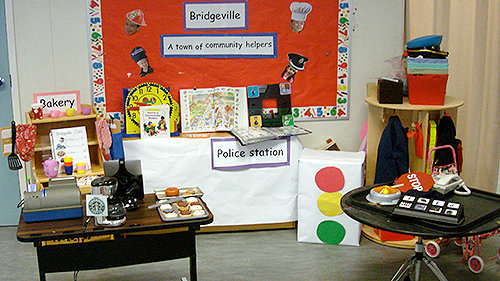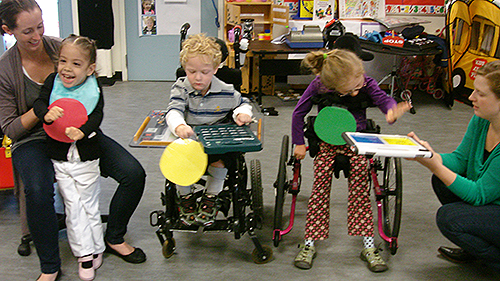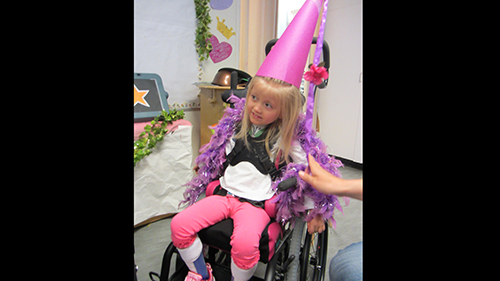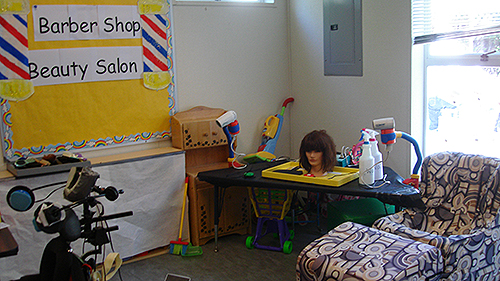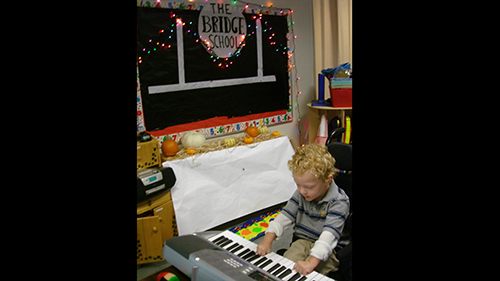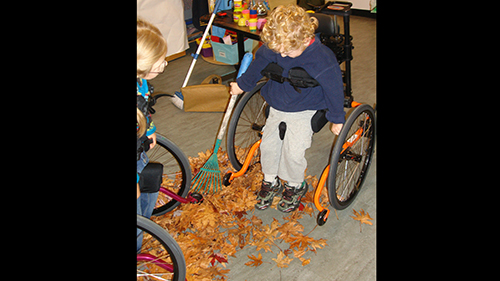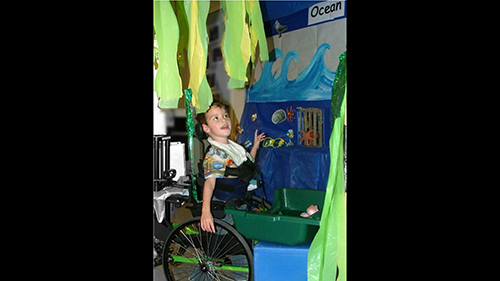Rationale for Use of Thematic Units
Preschoolers at The Bridge School participate in a series of theme-based units across the school year The structure of thematic units provides students an integrated approach to learning where developmental growth in several areas can be addressed within a fun, playful, and consistent context. The Bridge School uses Early Literacy in Action: The Language Focused Curriculum for Preschool by Betty Bunce to inform the framework for our preschool instructional program as it addresses the unique communication needs of our students. Although the focus of the Language Focused Curriculum is primarily language skills, thematic units also provide for social, cognitive, motor, literacy, and mathematic development.
The students at The Bridge School have significant physical impairments and complex communication needs. This results in dramatically different experiences in terms of language and access to play. Language ultimately supports development in cognitive, social, and academic skills, and has a large influence on effective learning. Play is the child’s way of learning and lends itself to several opportunities for rich language development in terms of discourse and vocabulary enhancement. In the context of play, the child also gets to assume different roles, interact with materials and practice literacy and mathematic skills. A carefully engineered environment that includes adapted props and toys, as well as language through AAC/ATtools and supports, ensures that students at The Bridge School gain access to the benefits of both language and play.
The thematic unit structure allows students to practice the language and concepts surrounding the theme in a consistent, familiar and meaningful context. Children will readily engage in familiar activities and by maintaining the theme for one to two weeks, students gain confidence, interest, and knowledge within a variety of thematic contexts. Thematic units also provide several different opportunities and activities to address targeted language and concept skills in order to respect and value individual personality and interest.
It is important to allow students opportunities to determine in what activities they want to participate and how they want to engage in the process while gaining access to thematic language and concepts. Learning to make choices regarding their participation also enhances independence, self-confidence and decision-making skills. Centers (pretend play, art, computer, and book area), Storytime, and Music are all influenced by the theme and have overlapping language and concept focuses to support the children’s growing understanding of the theme.
The preschoolers enjoy and have fun with a variety of thematic units across the school year, while growing in key developmental areas at the same time.
Bunce, B.H. (2008). Early literacy in action: The language-focused curriculum for preschool. Baltimore: Paul H. Brookes Publishing Co.
Hurley, S.R. & Blake, S. Animals and occupations: Why theme-based curricula work. Early Childhood News. Retrieved from http://www.earlychildhoodnews.com/earlychildhood/article_home.aspx?ArticleID=112.
During the Community Helpers theme students have a wide range of play schemas to choose from including, post office, police officer, cafe worker, and bus driver. Each student has a favorite role, and as the unit continues they are encouraged to try out different roles.
For the concept focus, students learn about addresses during group time and can do the activity again as one of the choices at the art table.
At Music, students sing a song about traffic lights, reinforcing some of the vocabulary seen during Centers.
Using a CheapTalk 8 with prerecorded messages, students have scripted vocabulary available to them so they can act out being a police officer. This vocabulary is later reinforced during Music.
Impact of Thematic Units on Daily Activities
Centers, Storytime, and Music provide the preschoolers with a variety of activities that relate to the theme to support targeted language and concept learning skills. Centers is a child-directed time where the child gets to choose what aspects of the theme to explore. Storytime and Music are teacher-directed times, where the teacher can more directly choose what language and concept skills of the theme to target and teach within a fun and informative format.
Students can gain better understanding and knowledge of thematic unit language and concept objectives by incorporating them in multiple activities and opportunities across the day. The following chart lists the scheduled activities across the preschool day and delineates which ones are influenced by the theme and which ones are independent of the theme.
Changing and Routine Activities Across the Preschool Day and their Relationship to the Theme
| Activities Influenced by the Theme | Activities Independent of the Theme | |
| Changes | Centers: Pretend Play Centers: Art Centers: Books Centers: Computer Storytime Music |
Reading and Math |
| Routine | Arrival Morning Circle Outside Time Mid-Morning Meal Sharing School News and Dismissal |
Selection of Topics
At the beginning of the school year, the staff meet to discuss the selection of topics for thematic units for the year. Some considerations for the selections include recurring themes such as community helpers and the seasons, special events including our annual benefit concert and the holidays, and standards-driven content areas addressing numeracy and literacy.
Development of Goals and Objectives
Several factors influence the goals and objectives for the group and for individual students in each of the thematic units. The curriculum in our educational program at The Bridge School is guided by the California State Common Core Standards. Our preschool curriculum is aligned with the California Preschool Learning Foundations and each child in our program has an Individual Education Plan that delineates specific goals and objectives to be addressed. Information from these three sources inform the expected outcomes from the group and the individual students.
Planning and Implementing Thematic Units
The speech language pathologist, teacher, and instructional assistants work closely together in the planning and implementation of Centers activities for the thematic unit. Themes that are highly familiar to students (for example, house) are chosen for the first months of school. For the rest of the year familiar themes are interspersed with unfamiliar themes to encourage student growth and experience. Many themes overlap and allow a repeated opportunity to practice vocabulary, concepts, and build upon prior knowledge and experience. For example, a unit on Fire Fighters might be scheduled for December and a unit on Community Helpers including fire fighters planned for February. These overlapping themes provide the students the opportunity to use familiar scripts while incorporating specific vocabulary and props that fit the theme.
Themes are also chosen to address specific preschool-age interests and needs. An important component of the preschool education is fostering positive self-esteem and concept. The Beauty Parlor/Barbershop, Doctor, and Veterinarian themes help students take an active role in learning more about taking care of themselves or others, which promote positive self-concepts. Preschoolers need a balance of familiar and unfamiliar activities to support growth, participation, and learning. Every student has individual themes with which they are highly familiar and those that are unfamiliar. By choosing themes that support both the familiar and unfamiliar, students are able to expand vocabulary, enrich experiences, and learn important language and concept skills. Some themes are chosen to support the fantasy/imaginary world of children. Outer Space, Jungle/Safari, Dinosaurs, and Fairy Tales themes encourage the preschoolers to stretch their imaginations.
Throughout the course of the school year holidays, seasons and events occur that young children are still learning about. By incorporating themes such as Halloween, Thanksgiving/Native Americans, Fall, Concert (before the annual Bridge School Benefit Concert), Airplane/Vacation, and Garden/Spring, students are able to act out different roles, practice relevant language and vocabulary, and learn important concepts that further enrich the child’s experience when the actual holiday/event occurs. Preparing students ahead of time for what to expect and what language/vocabulary to use and hear helps them become confident and active participants in the actual event.
In general, preschool age children show high interest in certain aspects of the world around them. Themes that support these interests, such as Construction Worker (particularly the construction trucks), are exciting and engaging for the preschoolers. Purposeful selection of thematic units across the school year contributes to language, vocabulary, and concept skill expansion and comprehension amongst the preschool age children at The Bridge School.
At the start of the school year, students have many unfamiliar activities and settings to learn about in their new classroom. By picking the House theme, students interact with an already known and familiar topic, giving them confidence to readily participate.
The Fairy Tales theme supports children in imaginative play. Students may have read fairy tales, and now they get to act out and take on roles that exist mostly in the imagination as princes, princesses, and knights in an enchanted and magical forest.
Fostering positive self-esteem and self-concept is an important component of the preschool classroom. During the Beauty Parlor theme, students get to take an active role in the grooming process by cutting, washing, and drying the mannequin’s hair. They can later take these skills and help in their own or others’ grooming process, which promotes positive self-image.
The week before the annual Bridge School Benefit Concert, students participate in the concert theme. During this theme students learn about and interact with all the things they may see, hear, taste, smell, and touch at the upcoming concert. Students arrive at the concert more prepared, despite the busy, loud, and unfamiliar environment. Given their experiences in the classroom they each have favorite things they know to look for at the concert (instruments, people, pumpkins, lights, etc.).
Fall is a common topic discussed throughout a child’s school years, in books, and on T.V. shows. The Fall theme is scheduled around the time the leaves outside are changing colors and falling to the ground. Students learn what this season entails and the language, vocabulary, and concepts surrounding it.
Some students live by the ocean and know all about it, while for other students this is something completely new. Whether familiar or unfamiliar with the content of a thematic unit, all students gain access to language and concepts that further their knowledge and experiences.
Check out the thematic units in action!

